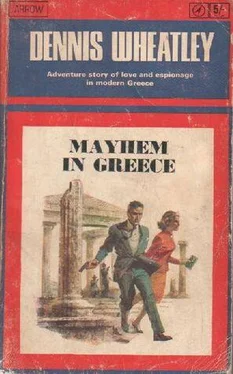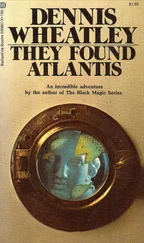'Are you quite certain the accommodation Krajcir was asked to book was not for batches of ordinary tourists?'
'Yes. Each group was divided into engineers and several grades of technicians. I'd bet anything that they are up to some game or other that won't do the Western Powers any good.'
Luke stood up. 'In that case, I'd be the last person to dissuade you from finding out all you can. Anyhow, I'll be keeping my fingers crossed for you these next few days. Should the worst happen, and H.E. does let the police cart you off, give me a ring, and I'll get you a decent lawyer. Now, I think it's time for bed.'
As Robbie escorted his friend back to the side gate and let him out, he said again and again how grateful he was for his advice. Then, after a last good night, he re-crossed the garden and went up to his room. Suddenly, he felt very tired. In spite of the anxiety he still felt about the outcome of the animosity he had aroused in the Czechs, almost as soon as his head touched the pillow he fell sound asleep.
In the morning, knowing that his uncle disliked unpunctuality, he was first down in the breakfast room. Euan Wettering arrived a few minutes later, gave him a surprised stare and said:
'Well, who would have thought of seeing our young fellow-traveller. What's the latest news from Moscow?'
Robbie reddened. 'You know jolly well that I only pretended Communist sympathies to get a job. Uncle must have told you that.'
'He told me that you had suddenly got the bit between your teeth and nothing he could say would prevent your disgracing the family.'
'He has been at me often enough to get a job,' Robbie muttered sullenly. 'And I got about the only sort of job I could be any good at.'
Euan grinned. 'Am I to assume, then, that you have come back to tell us how successful you have been at it?'
At that moment, Sir Finsterhorn entered the room and Euan went on sarcastically: 'Look who's here, sir. The Kremlin's latest and most brilliant protege. He has come back to tell us that he has just been appointed to lead the Glorious, Boneheaded, Thugminded Youth Movement of Czechoslovakia.'
'Shut up, Euan! Shut up!' Robbie burst out in desperation. 'Mind your own damned business.'
The expression on the Ambassador's face had shown no perceptible change. As he sat down at the table, he asked in a calm voice: 'When did you get back, Robbie?'
'Last night, sir,' Robbie told him. 'And please don't take any notice of the things Euan is saying. The truth is that I've got the sack, and I felt I ought to come back and tell you about it.'
'I don't mind betting orfe thing,' Euan chortled. 'You didn't get the sack for pinching the bottom of one of those plump-breasted workers' joys that the Iron Curtain countries send abroad as typists in their Legations. Did you sock your boss, or was it just laziness?'
'Euan!' Sir Finsterhorn intervened sharply. 'Why you should display so much malice toward Robbie, I have no idea. You will kindly refrain from baiting him. It will do us no harm to eat our breakfasts in silence. As for you, Robbie, I should like a few words with you in private afterwards.'
In the belief that the presence of a third party, even if antagonistic, tends to make matters easier during a dreaded interview, Robbie had hoped to get through his ordeal over breakfast. Now, Sir Finsterhorn's ban on speech condemned him to fifteen minutes' agonizing introspection and growing panic. At last the meal was finished, and he followed the Ambassador across the hall into his study.
Sitting down at his desk, Sir Finsterhorn put the tips of his fingers together, looked over them at Robbie and said only: 'Well?'
'I've not much to say, sir,' Robbie announced awkwardly. 'I didn't exactly get the sack. They put me into their Travel Agency, and I spent simply hours sorting folders and stamping envelopes. After a week of it, I was completely fed-up, and last night I had a row with the Manager, a chap named Krajcir. And I . . . well, I just decided to leave.'
'Does this mean that you are not going back; that you have broken with your Czech friends permanently?'
Robbie nodded violently. 'Oh yes, Uncle.' Then he added with unconscious candour: 'I'm sure they wouldn't give me another job, even if I asked for one.'
Sir Finsterhorn allowed his expression of severity to relax a trifle. 'You are, I trust, aware that this escapade of yours caused me grave embarrassment?'
'Yes, Uncle. I'm afraid it must have. I'm terribly sorry about that.'
'And I told you that if you took this job, I would not have you back at the Embassy?'
I know. I realize now that I ought not to have gone against
your wishes. But . . . well, I was terribly keen to prove myself.'
Again Sir Finsterhorn's face became a shade more amiable, and he said: 'I'm not blaming you for that, Robbie. Your upbringing has been so very different from that of a normal young man. It's only natural that you should suffer at times from a feeling of inferiority and wish to show people that they underestimate your capabilities. Even so, it is most unfortunate that you should have chosen to attempt to do so in a manner that has brought such discredit on yourself and embarrassment to all of us here at the Embassy. What have you in mind to do now?'
'Well, Uncle. I ... I was hoping that you would forgive me and let me remain here . . .'
Robbie had been about to say 'for the next few days'. But Sir Finsterhorn cut in with a quick shake of his head. 'Forgive you, yes; but let you remain here, no. Your having proclaimed yourself a pro-Communist makes that impossible.'
Robbie caught his breath. His heart seemed to rise up into his throat and choke him. His dread of arrest and prison surged back, leaving him for the moment tongue-tied. Luke had said so very definitely that if he left the Embassy during the next forty-eight hours, and the Czechs demanded police action against him, his number would be up. If his uncle expelled him here and now, he might find the police waiting round the corner, on the chance that he would be fool enough to come out, and they would be able to pull him in without going to all the trouble involved in making representations through diplomatic channels. At last, he managed to stutter:
'Uncle . . . please! Can't you let me stay here for a day or two? I ... I mean it will take me quite a time to pack. Can't I stay here just till Monday night?'
Sir Finsterhorn suddenly smiled. 'My dear Robbie, there's no need to take what I said like that. I've no wish to hurry you unduly. Of course, you must have time to pack and make your arrangements. In my view, your best plan would be to return to England. At least you have shown us that you are perfectly capable of taking care of yourself; and if you can do that in Athens, you can certainly do so in Cheltenham. No doubt you could arrange matters so that you leave here by the end of the week.'
'Oh, thank you, Uncle; thank you,' Robbie murmured, almost overcome with relief. Then, seeing that the interview was over, he turned and quickly left the room.
He had won his reprieve, but he knew that he was still very far from being out of the wood. At any time that day or the next, the police or a representative of the Greek Foreign Office might come to see his uncle, and blow everything wide open. He could only pray that Luke was right and the Czechs would decide that they had not a strong enough case against him to press for action. But if Luke proved wrong, the line he had taken
of concealing the truth would make his case worse than ever. He had burnt his boats, and with them any hope that his uncle would give him protection.
10
Wh
That Sunday proved the worst day that Robbie had ever spent in his life. It seemed interminable and, as though drawn by a magnet, he could not resist spending the greater part of it hovering in the vicinity of the hall. As his uncle's secretary was off duty, he used his room as a listening post, sitting in it with the door ajar and a book, on which he found it impossible to concentrate, on his lap. Every time the front-door bell rang, he jumped up and peered out, waiting with pounding heart to find out who the caller was.
Читать дальше












